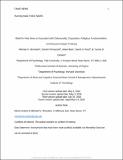Belief in Fake News is Associated with Delusionality, Dogmatism, Religious Fundamentalism, and Reduced Analytic Thinking
Author(s)
Bronstein, Michael V; Pennycook, Gordon; Bear, Adam; Rand, David Gertler; Cannon, Tyrone D
DownloadAccepted version (1.033Mb)
Open Access Policy
Open Access Policy
Creative Commons Attribution-Noncommercial-Share Alike
Terms of use
Metadata
Show full item recordAbstract
© 2018 Society for Applied Research in Memory and Cognition Delusion-prone individuals may be more likely to accept even delusion-irrelevant implausible ideas because of their tendency to engage in less analytic and less actively open-minded thinking. Consistent with this suggestion, two online studies with over 900 participants demonstrated that although delusion-prone individuals were no more likely to believe true news headlines, they displayed an increased belief in “fake news” headlines, which often feature implausible content. Mediation analyses suggest that analytic cognitive style may partially explain these individuals’ increased willingness to believe fake news. Exploratory analyses showed that dogmatic individuals and religious fundamentalists were also more likely to believe false (but not true) news, and that these relationships may be fully explained by analytic cognitive style. Our findings suggest that existing interventions that increase analytic and actively open-minded thinking might be leveraged to help reduce belief in fake news.
Date issued
2019Department
Massachusetts Institute of Technology. Department of Brain and Cognitive Sciences; Sloan School of ManagementJournal
Journal of Applied Research in Memory and Cognition
Publisher
Elsevier BV
ISSN
2211-369X